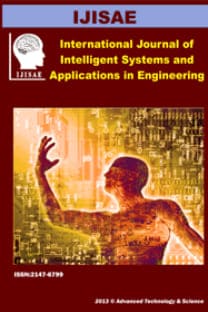A Multi-Criteria Decision-Making Method Based upon Type-2 Interval Fuzzy Sets for Auxiliary Systems of a Ship’s Main Diesel Engine
___
[1] C.H.Yeh and Y.H.Chang,“Modelling subjective evaluation for fuzzy group multi-criteria decision making”, European Journal of Operational Research,Vol. 194, 464–473,2009.[2] J.Ma, J.Lu, and G.Q.Zhang, “Decider: a fuzzy multi-criteria group decision support system”, Knowledge-Based Systems, Vol. 23, 23– 31,2010.
[3] Z.P.Fan, and Y.Liu, “A method for group decision-making based on multi-granularity uncertain linguistic information”, Expert Systems with Applications, Vol. 37(5), 4000–4008, 2010.
[4] S.Cebi, M.Celik, C.Kahraman, and I. D.Er, “An expert system auxiliary machinery troubleshooting: Shipamtsolver”, Expert Systems with Applications, Vol. 36, 7219-7227, 2009.
[5] N. Calder.1992. Marine diesel engines, maintenance troubleshooting and repair, 2nd ed., International Marine, Camden, Maine.
[6] H.C.Liu, L.Liu, N.Liu, and L.X.Mao,“Risk evaluation in failure mode and effects analysis with extended VIKOR method under fuzzy environment",Expert Systems with Applications, Vol.39.17 pp. 12926- 12934, 2012.
[7] S.Vinodh, S.Sarangan andS. Chandra Vinoth,“Application of fuzzy compromise solution method for fit concept selection”,Applied Mathematical Modelling. 2013.
[8] E.Martinez-Martin,M. T. Escrig, and A. P.Pobil,“Naming Qualitative Models Based on Intervals: A General Framework”, International Journal of Artificial Intelligence, Vol. 11.A13 pp. 74-92, 2013.
[9] Lee, L. W., and Chen, S. M. 2008. “Fuzzy multiple attributes hierarchical group decision-making based on the ranking values of interval type-2 fuzzy sets”. In Machine Learning and Cybernetics, 2008 International Conference on IEEE: 3266-3271,
[10]S. M.Chen, andL. W. Lee, “Fuzzy multiple attributes group decisionmaking based on the interval type-2 TOPSIS method”. Expert Systems with Applications, 37(4): 2790-2798, 2010.
[11]S. M. Chen, M. W. Yang, L. W.Lee, and S. W. Yang, “Fuzzy multiple attributes group decision-making based on ranking interval type-2 fuzzy sets”. Expert Systems with Applications, 39(5): 5295-5308, 2012.
[12]T. Y. Chen, “Multiple criteria group decision-making with generalized interval-valued fuzzy numbers based on signed distances and incomplete weights”. Applied Mathematical Modelling, 36(7): 3029-
[13]J. M. Mendel, R. I. John, and F. Liu, “Interval type-2 fuzzy logic systems made simple”. Fuzzy Systems, IEEE Transactions on, 14(6): 808-821, 2006.
[14]Lee, L. W., and Chen, S. M. 2008. “A new method for fuzzy multiple attributes group decision-making based on the arithmetic operations of interval type-2 fuzzy sets”. In Machine Learning and Cybernetics, 2008 International Conference on IEEE: 3084-3089.
[15]E. Celik, O. N. Bilisik, M.Erdogan, A. T. Gumus,&H. Baracli,“An integrated novel interval type-2 fuzzy MCDM method to improve customer satisfaction in public transportation for Istanbul”,Transportation Research Part E: Logistics and Transportation Review, 58, 28-51, 2013.
[16]E. Celik,A. T. Gumus&M. A Alegoz, “Trapezoidal type-2 fuzzy MCDM method to identify and evaluate critical success factors for humanitarian relief logistics management”,Journal of Intelligent & Fuzzy Systems: Applications in Engineering and Technology, 27(6), 2847-2855, 2014.
[17]Y. M. Wang, andT. Elhag, “Fuzzy TOPSIS method based on alpha level sets with an application to bridge risk assessment”,Expert Systems with Applications, 31(2): 309-319, 2006.
[18]S. Opricovic, Multicriteria optimization of civil engineering systems. Faculty of Civil Engineering, Belgrade, 2(1), 5-21, 1998.
[19]S. Opricovic, &G. H. Tzeng, “Compromise solution by MCDM methods: A comparative analysis of VIKOR and TOPSIS,”European Journal of Operational Research, 156(2), 445-455, 2004.
[20]G. H. Tzeng, C. W.Lin, &S. Opricovic,“Multi-criteria analysis of alternative-fuel buses for public transportation,”Energy Policy, 33(11), 1373-1383, 2005.
[21]B. Vahdani,H. Hadipour,J. S. Sadaghiani,&M. Amiri, “Extension of VIKOR method based on interval-valued fuzzy sets,”The International Journal of Advanced Manufacturing Technology, 47(9- 12), 1231-1239, 2010.
[22]M. S. Kuo, “A novel interval-valued fuzzy MCDM method for improving airlines’ service quality in Chinese cross-strait airlines,”Transportation Research Part E: Logistics and Transportation Review, 47(6), 1177-1193, 2011.
[23]S. P. Wan,Q. Y. Wang,&J. Y. Dong, “The extended VIKOR method for multi-attribute group decision making with triangular intuitionistic fuzzy numbers,”Knowledge-Based Systems, 52, 65-77, 2013.
[24]Y. Ju,&A. Wang,“Extension of VIKOR method for multi-criteria group decision making problem with linguistic information,”Applied Mathematical Modelling, 37(5), 3112-3125, 2013.
[25]E.Celik, M. Gul,N. Aydin,A. T. Gumus,&A. F. Guneri, “A comprehensive review of multi criteria decision making approaches based on interval type-2 fuzzy sets,”Knowledge-Based Systems, 2015.
[26]E. Celik,N. Aydin, &A. T. Gumus,“A multiattribute customer satisfaction evaluation approach for rail transit network: A real case study for Istanbul, Turkey,”Transport Policy, 36, 283-293, 2014.
[27]M.S.Kuo, G.S. Liang, “A soft computing method of performance evaluation with MCDM based on interval-valued fuzzy numbers,”Applied Soft Computing, 12(1), 476–4852012.
- ISSN: 2147-6799
- Yayın Aralığı: 4
- Başlangıç: 2013
- Yayıncı: Ismail SARITAS
Effects of Zero Velocity Update on Total Displacement for Indoor Inertial Positioning Systems
FARUK ULAMIŞ, MURAT LÜY, ERTUĞRUL ÇAM, İbrahim UZUN
Economical and Technical Challenges of a Large Scale Solar Plant
Comparison of Classification Techniques on Energy Efficiency Dataset
AHMET TOPRAK, NİĞMET KÖKLÜ, AYŞEGÜL TOPRAK, RECAİ ÖZCAN
Resilient Image Feature Description through Evolution
Hybridizing Taguchi Algorithm with Reference Ideal Method to Solve Machining Problems
Stemming Implementation in Preprocessing Phase for Evaluating of Exams Using Data Mining Approach
MEHMET BALCI, ŞAKİR TAŞDEMİR, RIDVAN SARAÇOĞLU
